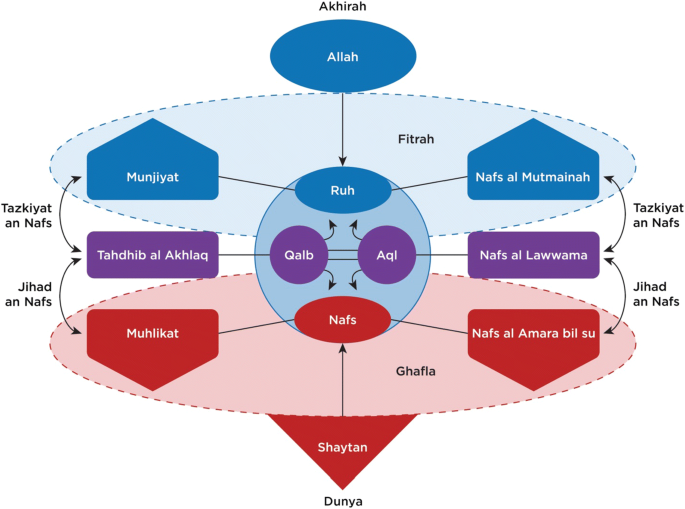Before tackling Islamic psychology, the first step is to dispel confusion.
When it comes to the distinct features of our being, what I found confusing at first was the Arabic words, their meanings, and their English translations.
Ruh can mean soul or spirit. The same for nafs.
The qalb can refer to the heart, but also, to the mind, soul, or intellect.
So before diving into Islamic psychology, it is important to have clear terminology.
What Makes Us Humans?

Ruh (Spirit)
The ruh is commonly referred to as spirit:
“Your Lord said to the angels, ‘I will create a mortal out of dried clay, formed from dark mud. When I have fashioned him and breathed My spirit into him, bow down before him.” [Quran 15:28-29]
The ruh constitutes the essence of our being, and yet, we know a little about it.
We find other places in the Quran where ruh refers to the Quran itself, the revelation, the angel Gabriel or the prophecy.
The common point between all these things is connection.
The ruh connects us to Allah. That’s what the revelations, the Quran, or the angel Gabriel do.
Nafs (Soul)
Allah didn’t expand that much about the ruh as He did with the nafs. So our focus should be on the latter.
Nafs means “self”. It’s translated as “soul”, “psyche”, or “ego”.
Muslims often associate the nafs with the lower self. In reality, nafs is not necessarily bad or evil.
The lower self is one of the stages of the soul known as nafs al amara bil su(the soul that commands to evil).
The other two stages are nafs al lawwama (self-reproaching soul) and nafs al mutmainah (soul at rest).
Our stage will depend on how much control we are exerting on the nafs.
What Is the Place of the Ruh within Ourselves?

Over and over, the Quran mentions the nafs and not the ruh.
The nafs is mortal, responsible, accountable, and inclined towards good and bad.
So if Allah doesn’t insist on the ruh, what is its place within ourselves?
The most convincing explanation I found is this.
When the ruh comes into contact with the body, it forms this being known as nafs (soul).
it makes sense to me because our inner world becomes similar to the outside world.
The whole creation is characterized by the balance of the opposites.
The sun and the moon. The day and night. The sky and the earth.
Similarly, the soul is between two opposites—the ruh and the body:
“By the soul and how He formed it and inspired it [to know] its own rebellion and piety, the one who purifies his soul succeeds and the one who corrupts it fails.” [Quran 91:9-11]
The Balance of the Opposites

On one end, we have the ruh that points to the sky and wants to connect us with the divine.
The ruh is the constant in ourselves. Everything changes.
The body changes over time whether physically or regarding its inclinations. The same for the soul. It’s constantly fluctuating between different states.
The ruh is most likely at the origin of our fitrah— our primordial and natural disposition.
The fitrah is the deep part of ourselves that already knows God and wants to connect to Him.
On the other end, we have the body and its inclinations.
The body is always pointing down to dunya (temporal world).
The endless satisfaction of the body creates distance between us and Allah and brings us closer to shaytan (devil).
The failure to control the appetites of the body doesn’t come without a price.
Ultimately, we bury our fitrah until it chokes to death.
But before killing our fitrah, we experience various psychological or physical diseases.
It can be anxiety, depression, sexual perversion, alcoholism, drug abuse, heart attack, cancer, and the list is long.
This is where Islamic psychology can play a different role compared to Western psychology.
Western Psychology vs Islamic Psychology

The purpose of Islamic psychology is to align ourselves with our natural disposition (fitrah).
Contrary to the Christian doctrine, Muslims believe that the fitrah is pure but gets corrupted by the world.
Even if we use ‘self’ for nafs, Islam and modern psychology diverge on the nature of the self.
Here’s how Baumeister defines the self:
“The individual’s belief about himself or herself, including the person’s attributes and who and what the self is.”
In Islam, the self is a spiritual being inhabiting our bodies.
Another surprising difference is that the Quran never mentions the mind or the brain. These two are the main focus of Western psychology.
Although the Quran mentions the faculty of intellect and making sound judgments, it doesn’t locate it in the mind/brain. Instead, it gives a higher place to the heart.
The heart is considered the spiritual center of the human being and the seat of consciousness.
Its true nature is missing in Western psychology.
The heart is the true commander and the place where all transformations start.
In Arabic, qalb refers to the heart. It means “permuting”, “transmuting”, or “turning”.
The heart has the potential to turn either toward worldly life or toward Allah. Each direction will lead to a set of behaviors that agitate or bring peace to the soul.
An Islamic Model of the Soul
Abdallah Rothman and Adrian Coyle developed an Islamic model of the soul.
This model is based on four things.
1-The Nature of the Soul
The soul is either in a state of fitrah (attracted by the divine) or in a state of ghafla—forgetfulness of Allah (attracted by dunya—worldly life).
2-The Structure of the Soul
The soul has its influencers. The qalb (heart) and aql (intellect) play a role in the direction the soul will follow.
3-The Stages of the Soul
-Nafs al ammarah (soul that inclines to evil): the soul is not necessarily inclined toward evil things. However, there’s an absence of awareness of God.
-Nafs al lawwama (self-reproaching soul): in this stage, the soul is struggling to resist the calling of the lower self. Few of us go beyond this stage.
-Nafs al mutmainah (soul at rest): this is an ideal stage where the lower self has no power to pull the soul downward.
4-The Development of the Soul
To move from the bottom stage to the middle one, we need to practice jihad al nafs (the struggle of the soul).
It’s a self-reflective process where we discipline the soul and not let the lower self run wild.
To move from the middle stage to the upper one, we need tazkiyat an nafs (purification of the soul). It’s a harder process where we uncover the soul from all impurities until it reflects our primordial nature.
I will expand more about the different parts of this model in future articles inshallah.
Final Thoughts on Islamic Psychology

Our reality is dual: physical and spiritual.
To live in a balanced way, we need our external eye and our inner sight.
The spiritual reality is an easy one to dismiss.
Fortunately, we have two kinds of knowledge that help us have a complete view.
One is acquired in this world and the other is revealed.
By combining acquired and revealed knowledge, Islamic psychology allows us a better understanding of our being.
If we don’t know ourselves, how can we know anything else?
The journey towards Allah begins with self-knowledge. From there, we work on our closeness to Him through a progressive alignment with our natural disposition.
This is what Islamic psychology can help us achieve.
Article posted the 12 July 2021
Popular Articles
- 7 Lessons from Luqman that Will Make You Wise
- How to Enjoy Salat and Make it Meaningful
- Mongols Invasions: Some Forgotten Lessons to Today’s Muslims
- For or Against Vaccines? That’s Not Really the Question
- Are Muslims Meant to Be Sleep Deprived?
- Islamic Psychology: A Model Where Faith Has Its Place
- Muslims Judging Each Other: Why and How to Be Less Judgy
- The Certainties of Muslims in Uncertain World
- Allah According to Allah: The Beauty Behind the Verse of Light
- Blindness: From the Invisible Gorilla to the Quranic Perspective
- How to Make People Change their Mind: Persuasion!

